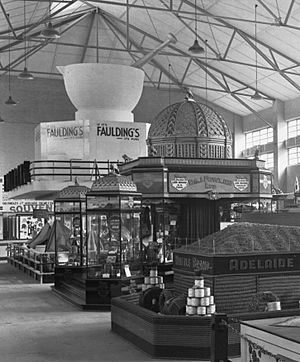- This page was last modified on 17 October 2025, at 10:18. Suggest an edit.
D. & J. Fowler Ltd. facts for kids
D. & J. Fowler Ltd. was a big company in Adelaide, South Australia. It started as a small shop in 1854, opened by David Fowler. Soon, it grew into a major business that sold groceries in large amounts to other shops. They also helped import goods from other countries.
The company created the famous Lion brand. This brand sold many different products like sweets, flour, coffee, and canned fruit. You can still find "Lion" brand flour today, though it's owned by a different company. D. & J. Fowler Ltd. owned many other businesses too. These included the Adelaide Milling Company (bought in 1895), the Adelaide Bottle Company (bought in 1912), and the Robur Tea Company (bought in 1928).
Southern Farmers Ltd., another company from Adelaide, took over D. & J. Fowler Ltd. in 1982 or 1983.
Contents
How the Company Started and Grew

A display of food products at the Centenary Exhibition in Wayville, around 1936.
The company was started by two brothers, David and James Fowler. They were born in Scotland. Their father owned a general store there. James Fowler came to South Australia in 1850. With help from his father, he opened a grocery store in Rundle Street, Adelaide.
His older brother, David, joined him in 1854. They soon moved their shop to King William Street, Adelaide. James, who handled all the paperwork, sadly passed away in 1858 after being sick for a long time.
Their third brother, George Swan Fowler, came to Adelaide in 1860. He became a partner in the business, but they kept the name D. & J. Fowler. In 1863, they bought the King William Street building they had been renting.
By 1865, the business was so big that they opened an office in London, run by David. George managed the main office in King William Street, which was completed in 1867. Also in 1865, they stopped selling directly to customers. They sold their retail shop to another company.
In 1873, they rented large storage buildings at Port Adelaide. These were not big enough, so in 1881, they built a huge warehouse. It could store 30,000 tons of goods!
The company also opened branches in other cities. These included Fremantle, Broken Hill, and Kalgoorlie. They became dealers for Shell products. They also started a shipping agency. This agency handled their own imports and exports like wool, wheat, and butter.
Making Their Own Products
Around 1880, the South Australian Government started a new rule. This rule encouraged local companies to make their own goods. Because of this, D. & J. Fowler Limited decided to start making groceries themselves.
Around 1882, Fowlers asked farmers in South Australia to grow chicory. This plant was used to make their "Lion" brand coffee.
They built a factory called "Paou Chung Factory" on King William Road. In 1883, their "Paou Chung" brand was the first packaged tea sold in South Australia. Their most popular tea, "Amgoorie," came out later in 1896.
Around 1885, John H. M. Hawkes became the manager of their manufacturing side. He started with a team of eight people.
They bought other companies that made food. They took over "London Condiment Company" and H. B. Hanton's. They renamed it the "Lion Preserving Company." This company made many canned fruits, jams, and pickles. A new factory for "Lion" canned fruit was set up in Nuriootpa, South Australia. They also bought Henry Harford's factory in Adelaide. This became the Lion Confectionery Works, making sweets.
They also bought the Adelaide Milling Company's flour mill in 1895. Later, they bought the Adelaide Bottle Company in 1912 and the Robur Tea Company in 1928. They made other products too, like "Maori" and "Clan" brands of oatmeal.
In 1888, they tried to open a fish preserving factory in Port Lincoln. However, they closed it three years later. It was too hard to get a steady supply of fish.
"Lion Factory" Building
A new building, called the "Lion Factory," opened in 1907. It was on North Terrace in Adelaide. Here, they packaged their "Lion" brand self-raising flour and other goods.
Years later, in the 1980s and early 1990s, the building was updated. It became a place for music and arts. In 1992, it was renamed the Lion Arts Centre.
Changes in Leadership
David Fowler passed away in England in 1881. This left George as the main partner in the company.
In 1899, D. & J. Fowler became a "limited liability company." This meant it was owned by shareholders. Some shares were given to the company's employees. James Robert Fowler was the first chairman of the directors. He retired in 1932, and W. Murray Fowler took over.
In 1982 or 1983, Southern Farmers Ltd. took over the company.
The Fowler Family
The Fowler family played a big part in the company's history. James Fowler (who owned a store in Scotland) had three sons who were important to the business:
- David Fowler (1826 – 1881): He was one of the founders.
- James Fowler (c. 1830 – 1858): He helped start the first store and managed the books.
- George Swan Fowler (1839 – 1896): He joined his brothers and helped the company grow a lot.
Some other notable family members include:
- James Richard Fowler (1865 – 1939): He was a chairman of the company.
- Laura Margaret Fowler (1868 – 1952): She was very important! In 1893, she became the first woman to graduate in medicine and surgery from the University of Adelaide. She later became a well-known missionary in India.
See also
- G. Wood, Son & Co. (another wholesale grocery company in Adelaide from that time)
- Lion Arts Centre (to learn more about the building that used to be the Lion Factory)
